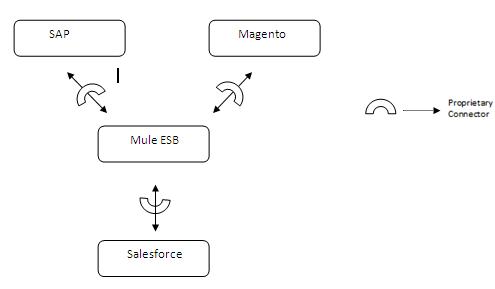Hexaware Acquires SMC Squared, a Leader in Building Global Capability Centers-Rolls Out GCC 2.0 Service Line. Learn More
This website uses cookies. By continuing to browse the site, you are agreeing to our use of cookies
An Integration Framework for Salesforce-oriented Enterprise Architecture:
Enterprise Platform Services
January 3, 2014
No trend in the world of IT is having more impact on businesses than the move to cloud computing. From enterprise applications like Salesforce.com, to infrastructure platforms like Amazon EC2, to social media services like Facebook and Twitter, the cloud is changing the IT landscape. However, as companies move their applications to the cloud, they are hitting a major roadblock for success, namely integration. So it is very important to come up with a well planned integration framework for their integrations. For this paper let us focus on giving a foundation for building an ESB based Integration Framework.
Let see the options Salesforce provides for different integration scenarios.
Salesforce Integration Options:
- Native Desktop connectors – Ex. Excel connector, Word Connector.
- Mashups
- Native ERP Connectors – Adapters built on Native ERP Language
- Integration Middleware connectors
- Developer toolkits. Ex. Custom developed code for integration
Why Middleware based Integration Framework:
So why should we care about developing a Middleware based integration framework? Because for large enterprises, in their complex application landscape it is very difficult to choose an integration method without a clear goal and alignment to their existing enterprise systems. It has become a necessity for the ISV’s and Software Companies which offer consulting services to their client to come up with their propriety integration framework to showcase their vision and strength on the complex integration arena.
In contrast to a point-to-point integration, where two applications are directly connected, application integration generally refers to using so-called “middleware” by adding a layer of abstraction between the applications. This layer uses either messaging middleware or an application server to pass communications between applications or Web services, either in real time or in batch mode. There are difference types of middleware
- Message-oriented Middleware
- Enterprise Messaging System
- Message Broker
- Enterprise Service Bus (ESB)
- Others
When to choose an ESB based Integration Framework?
The simple selection criteria based table below will guide us if we have to go for an ESB based Integration Approach for connecting our Salesforce CRM with other systems.

If for most of the questions you have answered yes then your scenario would be a good fit for an ESB based Integration Framework.
The Framework:
This proposed ESB based integration framework for Salesforce advocates the use of this custom framework in complex enterprises with integration with multiple applications. The custom Framework that this paper speaks about would be developed on top of open source ESB Mulesoft. The developers are expected to develop custom adapters using Mulesoft development tools. These custom built adapters along with documentation for standard integration (i.e integrating data among standard fields) will help complete standard integrations in very less time with less support.
A sample diagram provided Below:

Conclusion:
This paper just gives a foundation to build an ESB based integration framework for Salesforce based enterprise integrations. An in depth paper on the same subject could constitute a detailed study on existing Salesforce adapters available, Integration selection criteria checklist; Protocol based integration criteria, comparison of ESBs, custom adapters development time vs implementation time. An integration framework designed on these lines could serve huge enterprises with a shop for all the enterprise integration needs.
Related Blogs

Why AI and Automated Workday Testing Will Be Essential for Businesses in 2025
- Enterprise Platform Services

Workday Post-Go-Live Testing: Why It’s Critical for System Stability
- Enterprise Platform Services

SAP S/4HANA Migration Strategy: Brownfield vs. Greenfield vs. Hybrid Approach
- Enterprise Platform Services

S/4HANA Implementation Best Practices: Lessons from Enterprise Deployments
- Enterprise Platform Services

SAP Databricks: Transforming ERP Challenges into Opportunities
- Enterprise Platform Services

7 Reasons for Shifting Your Legacy ERP to the Cloud
- Enterprise Platform Services

Maximizing Business Growth Through RISE with SAP
- Enterprise Platform Services

5 Key Phases in Your SAP Implementation Journey
- Enterprise Platform Services

Seven Tips for Selecting the Right Oracle ERP Cloud Implementation Partner
- Enterprise Platform Services

6 Phases to a Successful Oracle ERP Cloud Implementation
- Enterprise Platform Services

Ready to Pursue Opportunity?
Every outcome starts with a conversation







